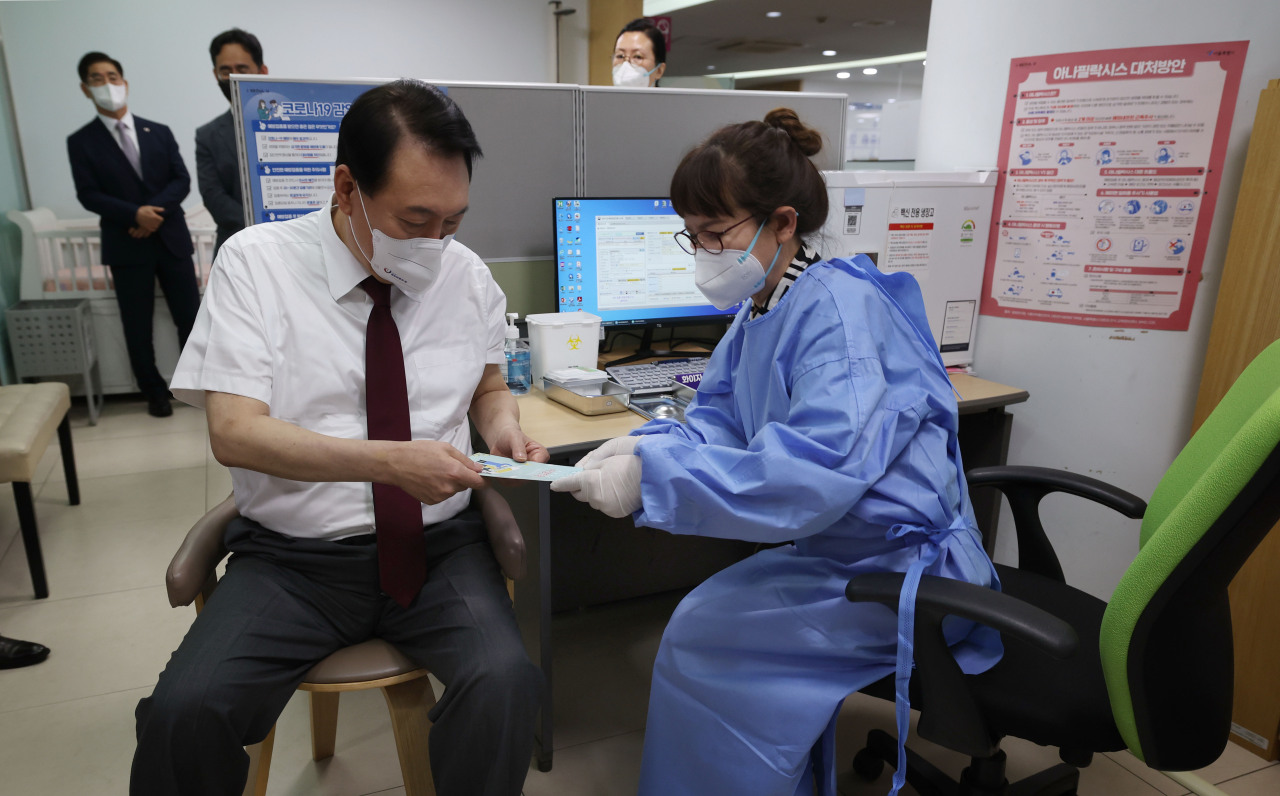
President Yoon Suk-yeol (left) speaks with a health care worker before receiving his fourth dose of the Pfizer vaccine on Wednesday at a public health clinic in Jung-gu, a central Seoul district. (Yonhap)
President Yoon Suk-yeol has said he would handle the pandemic better than his predecessor Moon Jae-in; that his response would be “driven by science rather than politics.”
But the shift that the president signaled was not realized in the summer resurgence preparedness plans announced Wednesday -- his administration’s first major COVID-19 measure -- with experts labeling them a repeat of what has already been done.
The presidential spokesperson’s office said Monday that Yoon, after being briefed by Korea Disease Control and Prevention Agency chief Peck Kyong-ran, told his Cabinet to “work as one team under the mission of a science-led COVID-19 response.”
The recurring themes in the new administration’s COVID-19 announcements are “science” or having a “basis in science,” which echo criticisms that Moon faced in how his administration shaped its response for over two years of the pandemic.
Some of the country’s top experts -- including Peck, who became Yoon’s first KDCA commissioner -- had raised alarms over the policy decisions. Social distancing restrictions were eased even as the daily number of cases grew. Hospital beds were running out at critical moments. Long-awaited vaccines were delayed.
But the BA.5 response plans unveiled Wednesday are a continuation of the “post-omicron” or “living with COVID-19” strategy that was engineered by the Moon administration, according to experts The Korea Herald interviewed.
Neither the “3T” strategy of rigorous testing, tracing and treating nor social distancing -- abandoned over the initial omicron wave that lasted from January through April -- are coming back. The concept of “focused protection” of vulnerable populations while the rest continue near-normal lives is still being upheld.
The stress on lowered mortality rates and flu comparisons, which were regularly mentioned as a rationale for less social distancing in COVID-19 briefings of the Moon administration, also came up Wednesday.
“Nothing new” came out of Wednesday’s announcement, infectious disease specialist Dr. Eom Joong-sik of Gachon University Medical Center told The Korea Herald.
The only meaningful difference was more generous compensation for people who have suffered adverse reactions following vaccination.
Dr. Kim Woo-joo, an infectious disease expert who serves as the president of the Korean Vaccine Society, agreed that he does not see the changes the president said would come in the policies announced so far.
“I don’t see new actions. They’ve just been given different names,” he told The Korea Herald. He said there were no measures to address issues proven to be a problem during the omicron surge, like the delays in diagnosis and treatment initiation for at-risk groups.
“With the BA.5 plans as they are now, we’re not preparing for the worst. We’re hoping for the best,” he said.
The COVID-19 committee of Yoon’s transition team had called Moon’s management of the pandemic “populist.” The committee’s head, Ahn Cheol-soo, said the pandemic decisions made by the Moon administration were “dictated by popular opinion, and not science.” “We failed to listen to experts when we needed to,” he said.
Kim said the administration in charge now has yet to improve on what it critiqued.
In a bid to live up to Yoon’s vows to have more science and less politics in the COVID-19 response, an independent committee of outside advisers was set up last month. Kim pointed out that nine out of the 21 outside advisers were from national universities and other government-affiliated institutions. “Based on how the committee is membered, it’s hard to expect independence,” he said.
In a Zoom conference with reporters Tuesday, the KDCA said it would no longer use the expression “science-led COVID-19 response” coined by the president to describe its policies.
“We always strive to base our decisions on science and evidence,” said a senior official on the accusation that the KDCA had been influenced by politics.
Jeong Eun-kyeong, the previous commissioner of the KDCA, said as she left office that political considerations were “naturally involved in the making of some policies like the extent of social distancing restrictions.”
“There were policies that required public participation and support, and I don’t think it’s quite fair to call them political or scientific because of that,” she said in a National Assembly meeting on May 17.
Peck has not endorsed the assessment of the pandemic handling in the past as having been “political.” “We’re fighting against a little-known foe, a novel virus. There’s bound to be some hits and misses,” she said during her first press conference held June 9.
Dr. Jung Jae-hun, who was a COVID-19 adviser to Moon’s Prime Minister Kim Boo-kyum, says the current response plans were an “outcome of the country’s over two years of experience with the pandemic.”
Officials who coordinated policies throughout the public health crisis were still “doing what they have been doing for the last two years,” he said in a Facebook statement Wednesday.
“Their efforts, like procurement of oral antivirals and expansion of hospital beds, have made it possible to manage the pandemic without reintroducing social distancing, which is both costly and painstaking,” he said.
“How the policies are termed or described might change, but there is no denying we are building on the achievements accumulated over the years.”
By Kim Arin (
arin@heraldcorp.com)






![[Graphic News] More Koreans say they plan long-distance trips this year](http://res.heraldm.com/phpwas/restmb_idxmake.php?idx=645&simg=/content/image/2024/04/17/20240417050828_0.gif&u=)